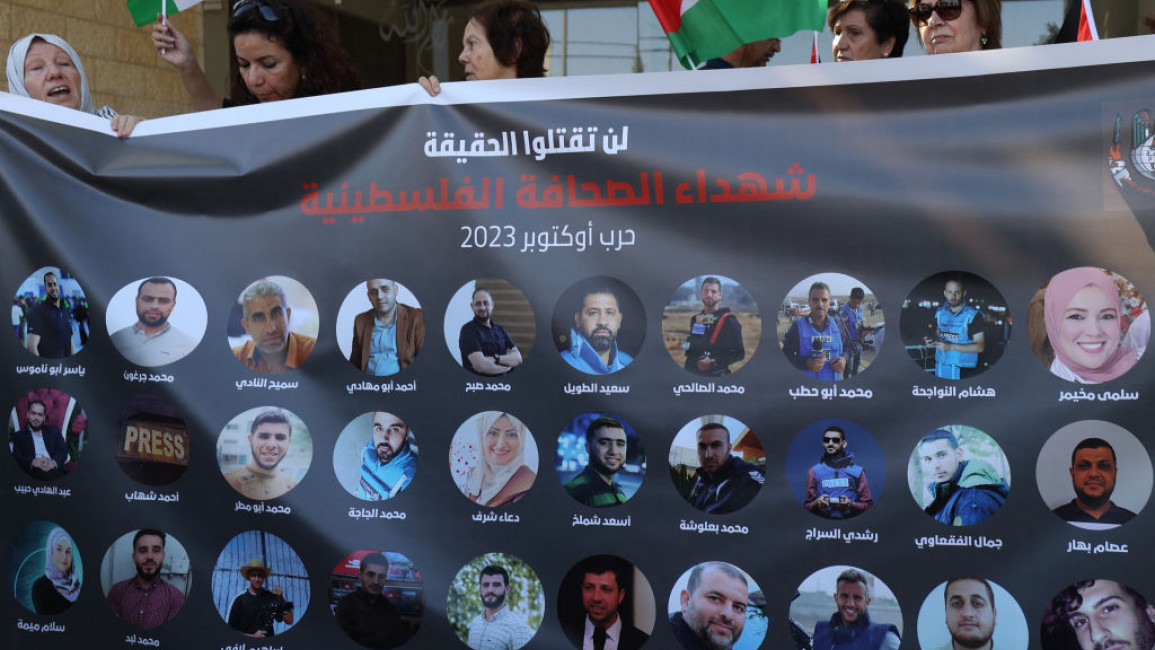Amid hunger and death, Palestinian journalists in Gaza dream of home-cooked meals
The very moment Israel's new war on the Gaza Strip erupted more than a month ago, dozens of Palestinian journalists rushed to cover what would become, perhaps, the most violent attack ever witnessed on the impoverished coastal enclave, which levelled homes, wiped out families and shattered the most mundane, daily routines.
Abed, a videographer, is among those Palestinian journalists still alive and who tirelessly move from one site to next to document the crimes Israel commits against the Palestinians, such as those killed by the Israeli airstrikes on their houses without warning.
Abed, a 35-year-old father of four, remarked to The New Arab that from the beginning of what he described as "an Israeli-US aggression" on Gaza, he often forgot to eat, but as time went on, he lost any sense of appetite.
"It was not easy for me to see scattered children and women. Every time, I felt that my children and my wife could be the next victims," the young journalist said. "I cried a lot, and sometimes I felt I really could not deal with the high number of casualties I filmed."
Yet, he continues with what he describes as a "national mission", recording events and surviving day-to-day, scrapping what food he can find. "My colleagues and I depend on canned goods, some pieces of bread, bags of chips, and chocolate," Abed explained to TNA.
Of the many things he misses in his life, his family, friends, and neighbourhood, Abed often finds himself acutely missing the home-cooked meals he used to have.
Recently, Abed, as well as three of his colleagues, finally got to eat some homemade Palestinian Kabsa prepared by another colleague's mother.
"Once the food arrived," he said, "I really cried. I remembered my wife and my mother. However, my starving belly asked me to enjoy the first homemade dish that I did not know if I would eat more of such food during the war or not."
Finding a small spot at the al-Aqsa hospital in central Gaza, Abed gathered with his colleagues to eat lunch. Not far from Abed, Ahmed, another journalist who is covering the war, also received a package of homemade food prepared by his aunt for the first time since the Israeli aggression erupted in Gaza.
"It is not only food. It is our kitchen culture that we missed for more than a month," the young journalist mused.
"As Palestinians, part of our food culture is we gather with our family members and eat from the same dish. Eating a meal together means that we will share side conversations about what happened during our day, which is often interspersed with some humour and sometimes some verbal fighting," he said, his eyes tearing up.
"I miss my family, mainly my mother and sisters," he added. "I do not know if they have enough food to eat."
According to the NGO ActionAid, a half million people in northern Gaza are facing severe food shortages and life-threatening illnesses due to the acute lack of food and water.
ActionAid warned that a near-total depletion of food and water supplies will further endanger the lives of Palestinians suffering under intense Israeli bombardment and a dire humanitarian situation. Markets are running out of vital food supplies, the NGO stressed.
"Nearly a month into the crisis, over half a million people, trapped in northern Gaza who have barely survived the relentless bombing, face death by starvation as food supplies run perilously low," ActionAid's Riham Jafari said.
"Aid is still trickling into Gaza, but even the small amounts of food and water that make it over the border are barely able to be transported north, as roads have been destroyed in the near-constant bombardment," Jafari added.



